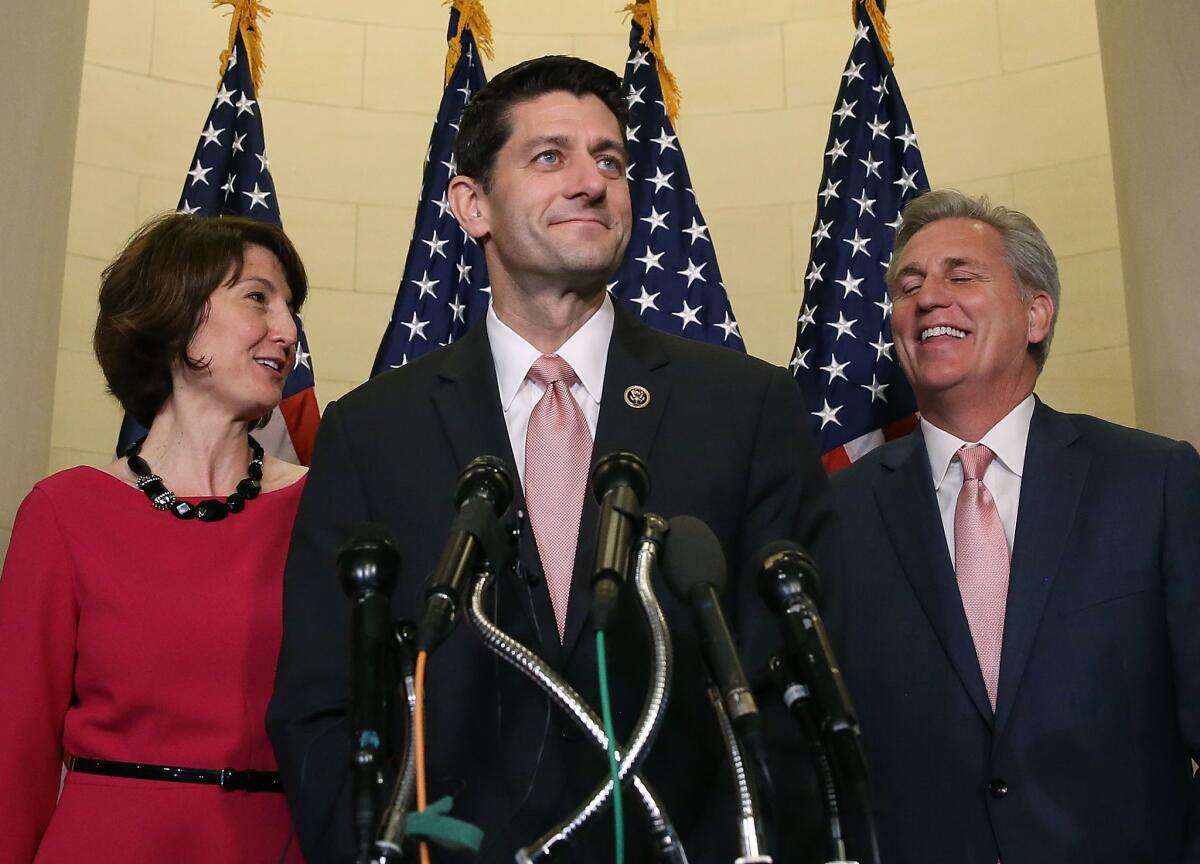Paul Ryan elected House speaker, but GOP divisions remain

Rep. Paul D. Ryan (R-Wis.) is flanked by House Majority Leader Kevin McCarthy (R-Bakersfield) and Chairwoman of the House Republican Conference Cathy McMorris Rodgers (R-Wash.) at the Capitol.
- Share via
Reporting from Washington — Rep. Paul D. Ryan was overwhelmingly elected House speaker by fellow Republicans on Thursday, closing a bitter and protracted leadership battle but not fully resolving the internal divisions that have upended the GOP majority.
After the vote, the Wisconsin congressman and 2012 GOP vice presidential nominee offered a tough-love outlook for the road ahead.
“Let’s be frank: The House is broken,” Ryan told his colleagues. “We are not solving problems. We are adding to them. And I am not interested in laying blame. We are not settling scores. We are wiping the slate clean.”
The vote came more than a month after Speaker John A. Boehner (R-Ohio) abruptly announced he would resign rather than continue fighting his caucus’ conservative flank.
That same hard-right faction doomed the candidacy of Majority Leader Kevin McCarthy of Bakersfield, who dropped out of the race for the post.
NEWSLETTER: Get the day’s top headlines from Times Editor Davan Maharaj >>
Ryan won the gavel with a convincing 236 votes from his GOP colleagues. Nine Republicans cast votes for a rival.
In a nod to his detractors, Ryan promised to allow rank-and-file lawmakers a greater role in shaping legislation, a key demand of the conservative wing.
“If there were ever a time for us to step up, this would be that time,” Ryan said. “The cynics will scoff and say it’s not possible. But you better believe we are going to try. We will not duck the tough issues.”
As lawmakers voted, Ryan’s wife, Janna, and three small children watched from the Speaker’s Box in the chamber. His former running mate, GOP presidential nominee Mitt Romney, also looked on.
Ryan is the 54th House speaker and, at 45, the youngest since 1869, in the aftermath of the Civil War.
In many ways, Ryan represents a new generation of Republicans, who came of political age during President Reagan’s administration and adhere to more conservative social and economic ideals than their mainstream colleagues.
Ryan is known for the “Ryan budget,” an austerity blueprint that has guided GOP thinking, as well as for his grueling P90X workouts and preference for hard rock music and Miller beer.
Before passing the gavel, Boehner advised his successor of the challenges he will likely face leading the largest Republican majority in decades.
“This is the loneliest place in the world, almost as lonely as the presidency,” Boehner said during an exit interview with reporters, seated in a leather wingback chair in his second-floor office overlooking the National Mall.
“What makes it even lonelier is, you realize at the end of the day, you got to make decisions, and those decisions have consequences, and those consequences fall back on one person,” he said between cigarettes. “So it’s something that takes a little getting used to.”
Boehner started his own career 25 years ago as a renegade who challenged the party’s then-leaders, particularly on pork spending from “earmarks.” But now the target of outsider ire as a face of the Washington establishment, he chose to resign rather than allow a divisive GOP floor battle with conservatives were planning to oust him.
“Around here,” Boehner said, “members run around and do all kinds of things. But someone has to be responsible for the institution. And I understood very quickly when I got this job, it was my No. 1 responsibility.”
“Paul has an opportunity to start fresh,” he said, “to build more confidence amongst those members.”
Ryan faces obstacles ahead, even after Boehner tried to “clean up the barn” on his way out with House passage of a two-year, $80-billion budget deal that also extends the debt ceiling into 2017, well past next year’s presidential election.
The hope was to allow Ryan some breathing room. The Senate is expected to approve the budget measure after a protest from conservative Republicans led by Sen. Rand Paul (R-Ky.)
Top of the agenda for Ryan will be passage by Dec. 11 of a bill to fund the government at the new budget levels and avert a shutdown.
Conservative lawmakers, including those in the influential House Freedom Caucus, also want to see Ryan put into practice the rule changes they demanded to loosen leadership’s grip on House procedures.
Ryan and the conservatives came to a truce over the rule changes, without agreeing to many of the specifics. But GOP leadership has promised upcoming party votes to put changes in place by the start of the new year.
But the GOP remains divided, with some of the more mainstream members worried about diluting control and handing too much power over to the factions.
By taking this job, Ryan may be cutting short his own political aspirations. He has long been considered presidential material, but the last speaker to make the move to the White House was James Polk in 1845.
House Minority Leader Nancy Pelosi, the San Francisco Democrat who had the post before Boehner during the most productive Congress in a generation, had less advice for Ryan than for his colleagues.
“I would say to the Republican majority, let the speaker be the speaker.”
For the latest from Congress and the 2016 campaign, follow @LisaMascaro
For more, go to www.latimes.com/politics
ALSO:
Republican debate: Candidates attack one another and the media
China scraps one-child policy as its society ages and workforce shrinks
How other teachers might have handled the texting South Carolina teen
More to Read
Sign up for Essential California
The most important California stories and recommendations in your inbox every morning.
You may occasionally receive promotional content from the Los Angeles Times.











